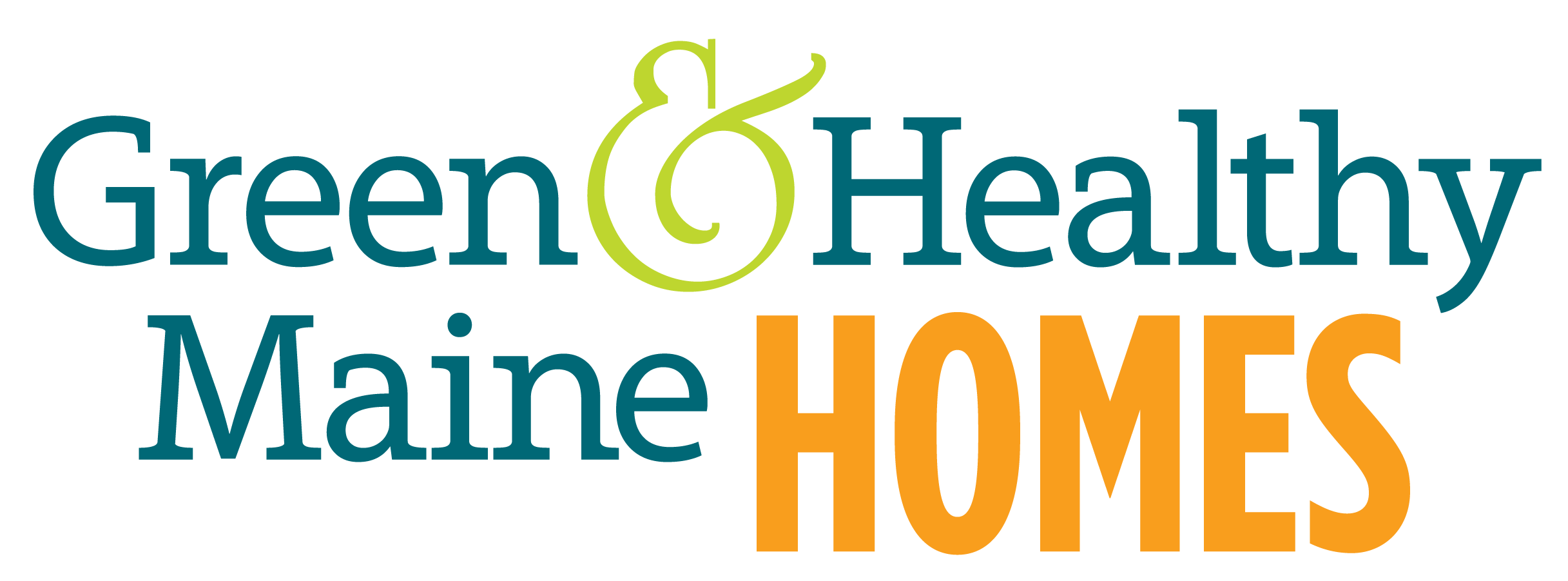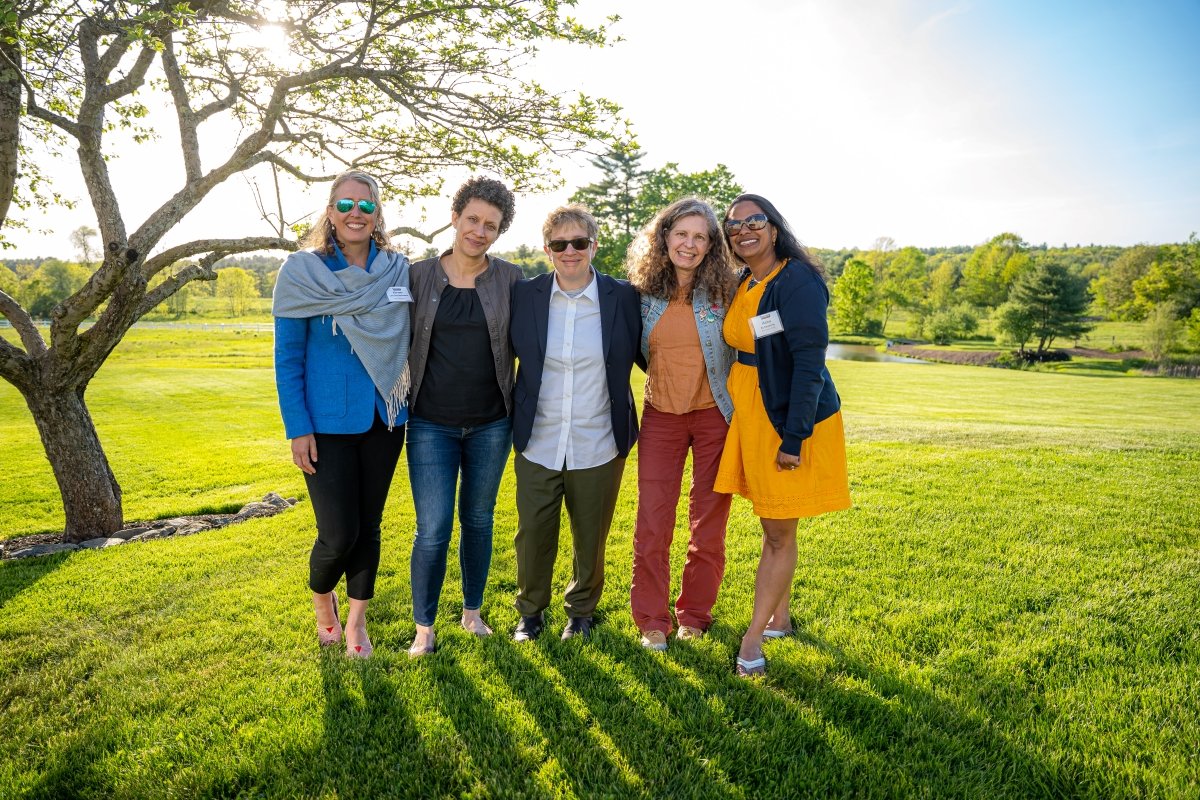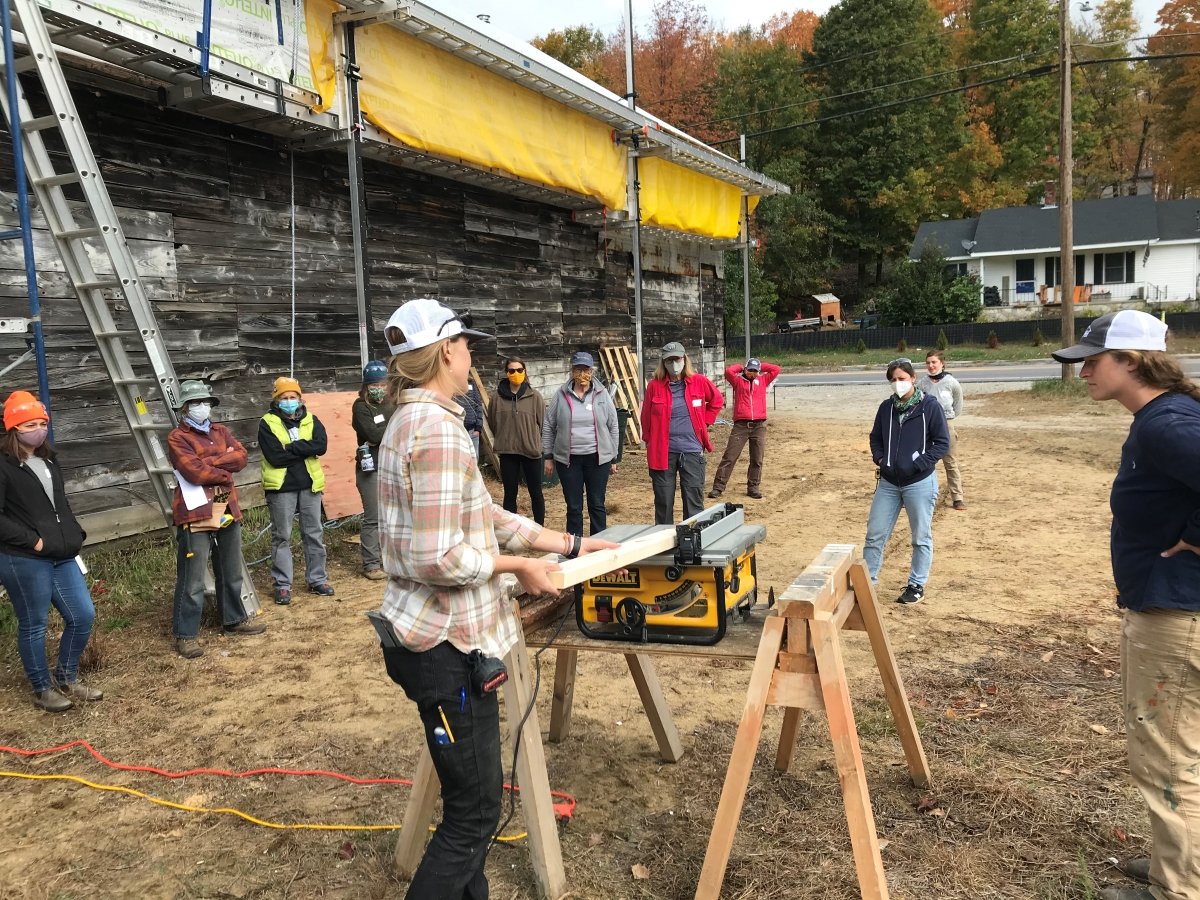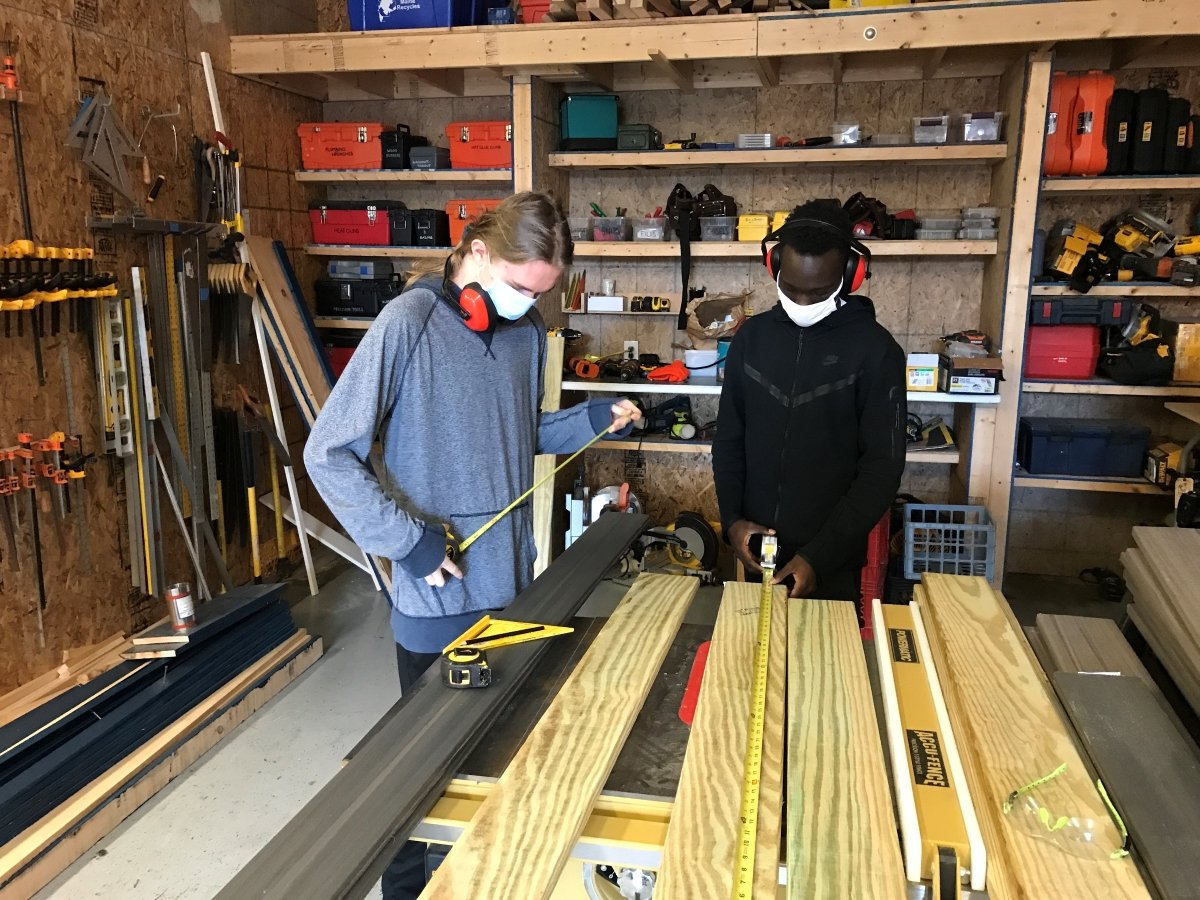Women and new Mainers are finding a home in construction
Carpenter Anna Ohara working in GO Logic’s Scarborough shop. Photo: Amy Paradysz.
Building Equity
By Amy Paradysz
IN THE MIDST OF THE CURRENT LABOR SHORTAGE, some of Maine’s most forward-thinking builders, designers, energy auditors and others in sustainable housing are also leaders in recruiting a more diverse workforce. To accomplish this, they’re doing anything from hosting skill-building and networking events for women in construction to sponsoring a Burundian soccer team to get to know new Mainers potentially interested in green-energy work.
“Research shows that companies that have more diversity—in ethnicity, gender and age—are more likely to be more innovative,” says Lisa Whited, a Portland-based change management strategist. “And the Portland area is remarkably diverse. Skilled, smart and talented people...are coming here with multiple degrees and multiple languages.”
To both attract diverse candidates and retain them, Asha Echeverria of law firm Bernstein Shur’s Construction Group says the key is to “be intentional at the highest levels of your organization with policies and expectations demonstrating the ideals of diversity and importance of every member of your team, down to things like zero tolerance for discrimination or harassment.”
There’s more than one way to be intentional. Maine Passive House, for example, has come close to achieving gender equity in their team and leadership mix, going from no women five years ago to six female team members out of 14. GO Logic uses a factory- and site-build model that allows for more ergonomic homebuilding, making the work more accessible to a wider range of body types and ages. Juniper Design+Build, founded in 2022, is led by two female powerhouses in Maine’s sustainable residential construction: Rachel Conly and Heather Thompson. And in the nonprofit arena, YouthBuild teaches young adults—many of them immigrants and women—basic construction skills and gets them handson experience working on Habitat for Humanity and Portland Housing Authority building sites.
The experience of Evergreen Home Performance demonstrates what all these organizations know: To hire successfully from a new talent pool, you need to spend time getting to know people in that demographic—but it’s worth being patient. “It’s not just a matter of posting a job and hoping some new Mainers will apply,” says Richard Burbank, whose Rockland-based company provides energy audits, insulation and Marvin windows and doors. “It’s about building connections and relationships.”
In the Portland area, Evergreen has a team of eight, including three women and three new Mainers. Evergreen is majority women-owned and, from its founding in 2007, the company has had a good gender balance. In 2018, a field technician originally from the Democratic Republic of Congo joined the team, and Burbank was interested in attracting more new Mainers.
Over many a cup at Burundi Star Coffee in Portland, Burbank got to know the shop’s proprietors, who introduced him to Thierry Mugabe, the president of the Burundian Community Association of Maine. Burbank asked for advice on how to create a company culture that would attract more new Mainers, and that’s how Evergreen came to sponsor a Burundian team in a season final soccer match against a Rwandan team in October 2021, with their house-and-pine branches logo on the Burundian team uniforms. Since then, Evergreen has hired two multilingual Burundi-born new Mainers, including soccer coach Albert Rwabirda, who speaks several languages and has many connections in Greater Portland’s immigrant community.
“We’re hopeful that with his language skills and connections in the community it will get easier and easier to be a welcoming place,” Burbank says. “You see, when hiring your first English language learner [on a team], they need to be fluent for their own safety. If you can’t convey, ‘don’t touch that wire or you’ll be injured,’ that is critical. But once you have folks who are fluent in languages that other new Mainers are comfortable with, you don’t have to wait for them to become fluent in English before they start learning the job.”
With more jobs than workers in the current economy, Burbank says, “We’re all tooling up to train people from scratch, and that levels the playing field.”
Yes, there can be some heavy lifting. But that doesn’t come up all that often, and his crews work in teams of four.
“It’s about willingness to learn and passion for what we’re doing,” he says, “which is serving customers well and doing quality work to reduce emissions that cause climate change.”
Evergreen Home Performance strives for staff diversity in ethnicity, gender and age. Photo: Molly Haley.
Speakers at law firm Bernstein Shur’s Women in Construction conference in May 2022: moderator Kevan Lee Deckelmann of Bernstein Shur, Sonia Barrantes of Ripcord Engineering Inc., Christine Grimando of City of Portland’s Planning and Urban Development Department, Lisa Whited of Workplace Transformation Facilitation and Asha Echeverria of Bernstein Shur. Photo: Jason Levasseur, Acoustified Media.
Not just men at work
Eight years into hosting Bernstein Shur’s Women in Construction conference, Asha Echeverria still hears from attendees that they sometimes felt isolated in a male-dominated industry and didn’t realize how many other women in Maine are working in building-related fields.
“Real estate agents, lenders, architects, engineers, general contractors, electricians—the full gamut,” says Echeverria, an engineer and lawyer. “Every year, I enjoy being in a room with women who speak the same language I do with regards to work.”
As board president of the Portland Regional Chamber of Commerce from 2020 to 2022, Echeverria has been deeply involved in conversations about racial equity, diversifying Maine’s workforce and dealing with labor shortages. She says that area business leaders are linking the ideas that what we ought to do to build diversity is also what we need to do to find workers.
“Representation and seeing that you can move up the ladder can be the glue that helps you to stick with your profession, your industry or your company,” she says. “And construction has good pay, good benefits and good job security. We have, to some degree, run the well dry looking for people in the same demographics we’ve already tapped. If we’re going to solve the worker shortage—and the skilled worker shortage, like electricians and plumbers—we have to expand where we’re looking.”
“Like attracts like”
It always starts with one.
Anna Heath studied environmental engineering, worked on a green building proposal in Korea and completed a college thesis on building envelopes. Then, when she planned to move back to Maine, she Googled “Maine” and “Passive House” and got a job as an apprentice carpenter with the western Maine company aptly named Maine Passive House.
Today, six of the 12 Maine Passive House employees are women. Heath was the first.
“The bottom line is, once there is an example of someone who looks like you in a workplace, it’s easier to picture yourself there,” Heath says. “Like attracts like.”
For the firm to get where it is today—with three women in management roles—retention was the next objective.
“There were two critical things we did that made it so that the second woman to join us was excited to be here,” Heath says. “First, when I was an apprentice, my supervisor observed subcontractor behavior on the job site and realized that we needed a subcontractor agreement that includes anti-harassment. Yes, you’re going to see women on the job site, and no, you can’t ask their supervisor if they’re dating anyone. That’s not workplace-appropriate. Really basic things. Then, we started pulling women into leadership pretty soon afterwards. Once you start to do that, there are advocates at all levels.”
A few years ago, Heath was talking with fellow carpenter Katrina Belle about wanting to teach carpentry skills in a fun and inclusive space. With three other women, they hosted a workshop called We Built This. Sixteen participants learned the basics of power tools, then built a sawhorse and their own toolbox. The workshop has continued as a series, with the Center for Ecology-Based Economy as the fiscal sponsor and Heath as the coordinator. Maine Passive House and others have opened their workspaces, donated materials or led specialized instruction, and participants have tried their hands at anything from chair caning to timber framing. They’re also giving back: As we head into winter, participants in We Built This are running the WindowDressers weatherization project in Maine’s Western Hills.
“The idea isn’t just to expose the people in the class to new skills but also to expose the hosts or teachers to this idea that women—or gender-queer people—know how to use tools,” Heath says. “And maybe I can hire from a different pool. You can expand what your company is capable of when you bring in different backgrounds and experience.”
Amelia Tracy brings a carpentry background to her work as a Health, Safety and Inclusion specialist for GO Logic. Photo: Lily Piel.
Ergonomics and economics
GO Logic also specializes in high-performance building—but with the speed and precision of factory-panelized construction. And this has implications for workforce diversity, according to Amelia Tracy, the company’s carpenter-turned-Health, Safety and Inclusion specialist.
“The benefits of offsite construction, or panelization, mean that you’re working on a table rather than a ladder,” Tracy says. “Because of that, the work is more safe and more ergonomic—for anybody.”
Carpenter Anna Ohara says building walls in GO Logic’s shop in Scarborough, as opposed to on site, “removes a lot of barriers, physically and mentally.” She had always been interested in carpentry but doesn’t love work 30 feet up.
“Most people in construction are young and, over time, bodies fail,” Tracy says. “We have a focus on reducing the potential for physical harm and reducing wear and tear. If we can use a machine to move a heavy thing, let’s do that. And that can be helpful for women and our gender-nonconforming staff.”
A crucial piece of diversifying the workforce, she says, is having deliberate training and onboarding—not just to avoid a survival-of-the-fittest situation but to make sure everyone is speaking the same language when it comes to worksite communication.
“Construction has so many dialects, depending on what trade you’re in or what lineage you came from,” she says. “How you do things, even typical things like build a wall—the myriad ways to do that are languages. It’s about that orientation to creating emotional safety to discuss something with a diverse population. And we haven’t had to do that a lot in New England, so it can be a new skill set for a lot of folks. But it’s fun. And if you have open-minded people, it’s possible to do it really well.”
Why invest the time and make the effort? Besides that it’s the right thing to do?
“We might be moving into a recession,” Tracy says. “If you look at Diversity, Equity, Inclusion and Belonging reports, we know that diversity at the executive level [means that the company] weathers downturns and comes out of them more profitably. One reason is that they’re better able to understand the cultural landscape—technological disruption and advances. With more diverse leaders, you’re better able to appreciate, understand, anticipate and bring value to your customers.”
Carpenter Anna Ohara working in GO Logic’s shop in Scarborough, where offsite panelization optimizes safety. Photo: Amy Paradysz.
High performance with high aspirations
As an award-winning design/build company focused on high-performance homes, Juniper Design+Build is intentional in everything it does. And it’s prominently stated on their website that they are a majority women-owned company.
“It’s something we’re proud of,” says Heather Thompson, who merged her company Thompson Johnson Woodworks with Rachel Conly Design, based in Portland. “It’s representation. And it sets a vibe that attracts customers we want to work with. We’re trying to put it out there in all our marketing that we’re interested in working with people who aren’t cis[gender] white men in their 30s—although, we do work with some of them, and they’re great.”
Of a crew of 20, they have four women—and they want to work to balance those numbers more over time. “We want people who can think creatively, have good hand-eye coordination and can work through problems in a logical way,” Thompson says. “We’re interviewing people who might not fit the typical mold of a construction worker.”
Conly talks about workplace comfort, saying, “It’s about creating a culture of transparency and support, and working on everyone having a voice. We’re trying to think differently about how people work together, and who is doing the work and trying to advance a more equitable society.”
But it’s not easy.
“We’ve reached out to Portland Adult Ed about potentially hiring new Mainers,” Thompson says. “In the midst of starting a new company—” She sighs, concluding, “It will have to be a focus over the next year or two.”
It takes time.
Juniper Design+Build carpenter Mary Henson measuring for a complex cut on a piece of baseboard. Photo: Will Crosby
Building up a young workforce
Over the past three years, 85 members of LearningWorks YouthBuild have rehabbed or helped construct multiple units of affordable housing around southern Maine.
YouthBuild is a Portland-based nonprofit that helps young adults ages 16–24 find a path forward after dropping out of high school. About one-third of members are English language learners. Half are women. Most have experienced homelessness or housing insecurity.
“They have a hard time imagining what their options are,” says Executive Director Heather Davis. “Societal forces might pressure them toward lines of work associated with one gender, so we make a big effort to make sure each of our cohorts is as evenly split between men and women as possible.”
Students Tony Oduki and Gabe Anderson, 2022 YouthBuild graduates, measuring boards for cutting. Photo: Nate Snow.
Instruction includes High School Equivalency Test (HiSET) preparation and hands-on training in construction and culinary arts—everyone does both.
Within a year, most members have passed the HiSET test and earned workplace certifications from the Occupational Safety and Health Administration (OSHA) and the National Center for Construction Education and Research, facilitated through Associated Building Contractors of Maine.
“All of our students practice technical skills, learn to use tools and work on individual projects in the shop,” says Program Director Nate Snow. “And then they might be rehabbing houses with the Portland Housing Authority, like building safer or more accessible decks this past year, or working with Habitat for Humanity on all aspects of the homebuilding process. Framing and interior work. Insulation. Siding. Getting exposure to different trades.”
Whether they’re learning to use power tools or how to write a recipe, members gain confidence.
“Being able to run power tools to fix something around the house and not have to pay someone is really empowering, especially for the young women in our program,” Snow says. “And I’d say the same thing about the young men and our culinary program, increasing their comfort level in the kitchen. We want to provide balance. We also want our students to see practitioners in the trades who might look like them or have a background like theirs and see it is somewhere they can go. To promote and include gender equity in programming, we try to bring in diverse employers.”
The YouthBuild-to-construction job pipeline may be at a slow trickle right now, with just a few of each cohort of 15 members going into jobs on the periphery of construction, like demolition or painting. But that will pick up, thanks to a new partnership with ReVision Energy to introduce YouthBuild participants to sustainable energy work and a new Maine Department of Labor grant that will create apprenticeships for young women and English language learners.
This article appeared in the Fall 2022 edition of Green & Healthy Maine HOMES. Subscribe today!
Find Maine experts that specialize in healthy, efficient homes in the Green Homes Business Directory.










